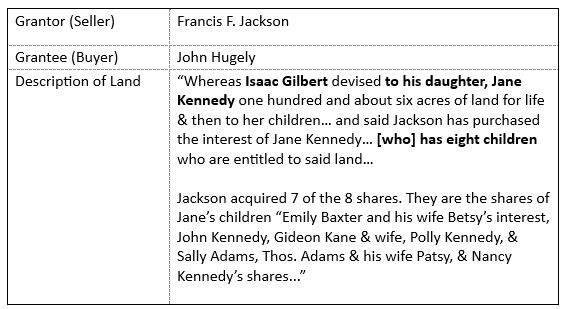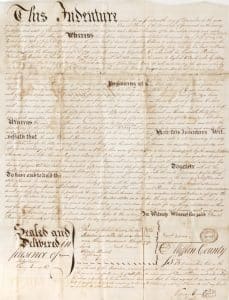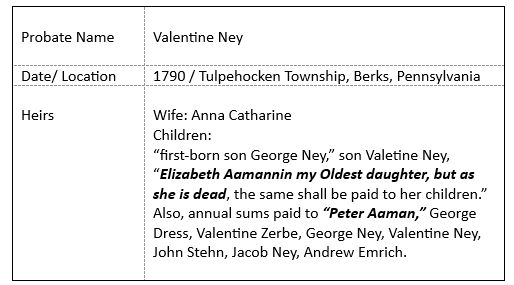Research Game Changer: FamilySearch’s New Full-Text Search
 19
19Sep
 Recently FamilySearch released a beta version of its new full-text search tool to its “Labs” site, available for researchers to use today. This capability has changed how we can research and can dramatically reduce the time it takes to break through genealogical mysteries.
Recently FamilySearch released a beta version of its new full-text search tool to its “Labs” site, available for researchers to use today. This capability has changed how we can research and can dramatically reduce the time it takes to break through genealogical mysteries.
For many years, FamilySearch focused on indexing the records they had digitized from their microfilm collections, thus creating a searchable index to help people find their ancestors in the sources. Other records, such as land and probate documents, are indexed by the court when filed. However, anyone who has participated in the indexing program or researched in county deed books knows that there is still quite a bit of information in the records that is not captured in the index. This is why full-text search is so transformational for genealogical research: while the original indexes typically reference only the main individuals on the document, the people you may be searching for are buried within the text; with the new tool, the entire digitized document is searched.
When released earlier in 2024, the beta version tool included full-text search of Mexican Notarial Records from 1600-1909, as well as U.S. Land and Probate Records covering 1630-1975. Mexican notarial records can cover a range of life events, such as marriages, divorces, contracts, deaths, wills, guardianships, and inheritance, and typically include family names and relationships. U.S. probate records can include the last will and testament, executor and administrator bonds, inventories, public notices, bills, guardianships, and other documents that are all part of the legal court proceedings for processing an estate when someone dies. (Note that not every family chooses to probate a deceased family member’s estate.) Probates are typically indexed by the name of the deceased, but the files frequently contain the names of children, siblings, parents, spouses, and neighbors. They also include information about land, occupations, and wealth. The new full-text search tool can now find those people in the files.
More recently, FamilySearch has added more record collections (drawn from their vast collection of digitized microfilms) including some Australia and New Zealand probate files and U.S. Plantation Records. Because enslaved people in America were considered property, their lives were not documented in court, county, census, and other government records. Rather, researchers turn to plantation records to gather the names of the enslaved, and to find births, marriages, deaths, and when a family member was sold and forced to leave. Until now, researching in plantation records generally required a page-by-page reading to find the hidden gems; full-text search should speed the process of discovery.
To access this new tool, (1) sign in to FamilySearch.org, (2) navigate to the Labs site here https://www.familysearch.org/en/labs/ and (3) click “Go To Experiment” under Expand your search with Full Text box.
Here are two common problems that can be aided with full text searching.
Problem #1 – Find the parents of a known ancestor
A Madison County, Kentucky marriage record showed that Jane Gilbert married Arthur Kennedy on 28 September 1801. But the surnames Kennedy and Gilbert are both quite common, especially in Madison County. Who were Jane’s parents? A typical probate search would use an index to find all the potential Gilberts and require reading each and every file, hoping to find a reference to Jane.
Using full-text search, by entering “Gilbert” and “Kennedy” and narrowing the results to Madison County, Kentucky, found exactly what we needed in a deed dated 5 October 1841.

 The deed is a genealogical gold mine, but it was indexed under the surnames Jackson (Grantor) and Hugeley (Grantee) and would never have been found without full text search.
The deed is a genealogical gold mine, but it was indexed under the surnames Jackson (Grantor) and Hugeley (Grantee) and would never have been found without full text search.
This deed links Jane Kennedy, wife of Arthur, to Isaac Gilbert so we now know which Gilbert family in Madison County. It also lists seven of her children (which maps to some of the known children from census records), so we know it is the right Kennedy. Because many of her daughters were married, we also now know the names of their spouses (Emily Baxter, Gideon Kane, [unknown] Adams, and Thos. Adams). We also know that daughter Nancy Kennedy was not married by 1841.
Another deed by this same search found the eighth child’s name; it was William Kennedy who had refused to sell his share in his mother’s inheritance to Jackson.
Problem #2: Finding a married woman’s birth family
A common genealogical brick wall is finding the birth surname of a woman, especially in pre-1850 U.S. research. A wife’s first name may appear on a deed or census, but she will rarely appear with her birth family. Full text search can help there too.
German migrant Peter Auman settled in Tulpehocken Township, Berks County, Pennsylvania, sometime in the 1750s, and baptized some of his children (born between about 1763 and 1780) in the Blue Mountain Church there. Frustratingly, the baptism records only named Peter “and wife,” so there was no hint of his wife’s first name.
Without knowing the given or surname of Peter’s wife, the only way to possibly find her birth family would be to collect a large list of known associates and neighbors and start reading all the probate and land records for that community. It could take hundreds of hours, perhaps years to find her family.
Full text search shortened that process to less than 30 minutes. A full text search of “Peter Auman,” with results narrowed to Berks County and the late 1700s / early 1800s found nothing. The surname Auman can be spelled many ways, including Awman, Allman, Almond, Ammon, Amen, Aman, and even Houghman.
Fortunately, FamilySearch’s tool allows for common search operators, so the search “A?man” was used and found a result: a probate file indexed by the county court under the deceased’s name Valentine Ney (or Neu).

While “Aaman” is a new spelling, it accords with German pronunciation of the name, and adding “-in” for Elizabeth is simply a German method of turning a noun feminine. This probate clearly lists Valentine Ney as Elizabeth Auman’s father, and states that by 1790 she is the deceased wife of Peter Auman. The men listed as heirs are the husbands of Elizabeth’s sisters. DNA research later confirmed that descendants of Peter’s older children shared DNA with Ney descendants. Because Peter and Elizabeth are buried in the probate file, we would have never found them in any index search; only full text could find them.
Tip: Creative and Flexible Searching is Necessary
This Auman search result is an important reminder to be flexible and creative in search terms. The automated full-text search mis-read the name as “Peter Adman” even though the document is very clearly written as Aaman. Genealogists are used to searching for creative spellings, but to use this tool effectively they will also need to think more broadly and be willing to investigate what may appear to be completely wrong results.
Coming Up
The next post will address some tips and tricks for using FamilySearch Full Text Search including solving additional genealogical problems, as well as explaining some search skills and where to find the full citations for sources found.
In the meantime, let Price Genealogy help you discover your family history! Our expert researchers will help you break down your brick walls.
Karen
Sources:
"Madison, Kentucky, United States records," images, FamilySearch (https://www.familysearch.org/ark:/61903/3:1:3Q9M-C3QY-DSRY-N?view=fullText : Aug 1, 2024), image 124 of 528; entry for Jackson to Hugely, Oct 1841
"Madison, Kentucky, United States records," images, FamilySearch (https://www.familysearch.org/ark:/61903/3:1:3Q9M-C3QY-D94X-3?view=fullText : Aug 1, 2024), image 326 of 595; entry for Cow to Huguley, 1 Jan 1846.
"Pennsylvania Probate Records, 1683-1994," images, FamilySearch (https://familysearch.org/ark:/61903/3:1:3QS7-L991-6QZS?cc=1999196&wc=9PMN-L23%3A268499201%2C271946601 : 3 July 2024), Berks > Estates 1752-1799 Miller, Christian-Parker, William > image 1882 of 2244; entry for Valentine Ney, 1790.
Images: public domain, and by the author
